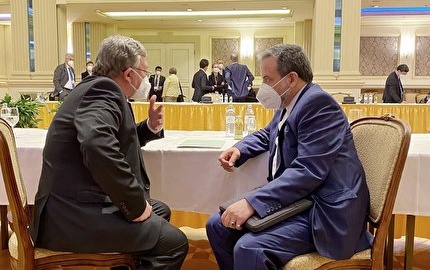Iranian Deputy Foreign Minister Abbas Araqchi with Russian diplomat Mikhail Ulyanov on sidelines of talks on Iran nuclear deal, Vienna, Austria, May 19, 2021
UPDATE, MAY 21:
Top Iranian officials have put out contradictory statements over the status of the nuclear talks, particularly over the lifting of US sanctions.
President Hassan Rouhani said on Thursday in a televised Cabinet meeting:
The talks in Vienna are about minor issues. They have accepted to lift sanctions on Iran’s oil and shipping sectors as well as sanctions on the Central Bank and others.
But a “senior Iranian official” told Press TV — a primary outlet for statements by unnamed sources within the regime — that the US has no intention to “completely lift any sanctions on the oil, banking, finance and energy sectors”.
Instead, “Washington intends to temporarily suspend some of the sanctions over a long period of time and in various steps,” the official said.
ORIGINAL ENTRY, MAY 20: Delegations at the Iran nuclear talks in Vienna have expressed confidence that an agreement is approaching over US re-entry, lifting of American sanctions, and a return to Iranian compliance.
However, some diplomats have expressed caution that success is not guarantees as difficult issues remain.
The fourth set of discussions concluded on Thursday. The coordinator of the talks, the European Union’s Enrique Mora, said, “I am quite sure that there will be a final agreement….I think we are on the right track and we will get an agreement.”
The head of the Iranian delegation, Deputy Foreign Minister Abbas Araqchi, echoed:
We can now say that we’ve reached the framework and structure of an agreement. The main text and annexes have been prepared.
However, the talks over the draft have not ended. There are differences over some key issues.
#Iran DepFM Araghchi: We’ve had a very good progress. But we cannot say yet that the job is done. We hope that the next week when we resume the talks, the delegations will have made their decisions for reaching an agreement.#JCPOA pic.twitter.com/4qKaEHDoVR
— Abas Aslani (@AbasAslani) May 19, 2021
European diplomats said in a statement, “There are still some very difficult issues ahead. We do not underestimate the challenges that lay before us.”
In Dublin, Irish Foreign Minister Simon Coveney assessed after talks with Iranian counterpart Mohammad Javad Zarif, “A deal is far from done though because this is a big technical negotiation.”
The EU’s Mora summarized to reporters, “We have made substantial progress over the last ten days. But there are still things to be worked out, and we will reconvene next week and we will continue working.”
A Final Round of Talks Before A Deal?
Iran had publicly insisted on the lifting of all US sanctions as a precondition. But the talks have focused on confirmed a “sequenced” approach, linking the removal of American restrictions to Iran’s return to the terms of the 2015 deal.
In January, Iran renewed its pre-2015 level of enrichment of 20% uranium, and limited inspections by the International Atomic Energy Agency. Following a deliberate explosion — likely organized by Israel — inside its main nuclear complex last month, Tehran announced its first enrichment of 60% uranium. That approached the 90% grade required for military use.
Iran’s agreement with the IAEA over inspections expires on May 21. The European diplomats said in their joint statement, “It is critical that Iran allow the IAEA to continue its necessary JCPOA [Joint Comprehensive Plan of Action] monitoring and verification work. And it is in everyone’s interest that Iran resumes implementation of the Additional Protocol at the earliest date possible.”
After conferring in national capitals, delegation return to Vienna next week. Russia’s lead negotiator, Mikhail Ulyanov, tweeted that he expects the round to be the last one before agreement.
US State Department spokeswoman Jalina Porter said the talks “really helped to crystallize towards the steps that need to be made by Iran as well as by the United States”.


LARIJANI: “The votes for Ahmadinejad in 2009 were authentic” https://www.khabaronline.ir/news/1517143
Larijani is a presidential contender and a critic of the former president.